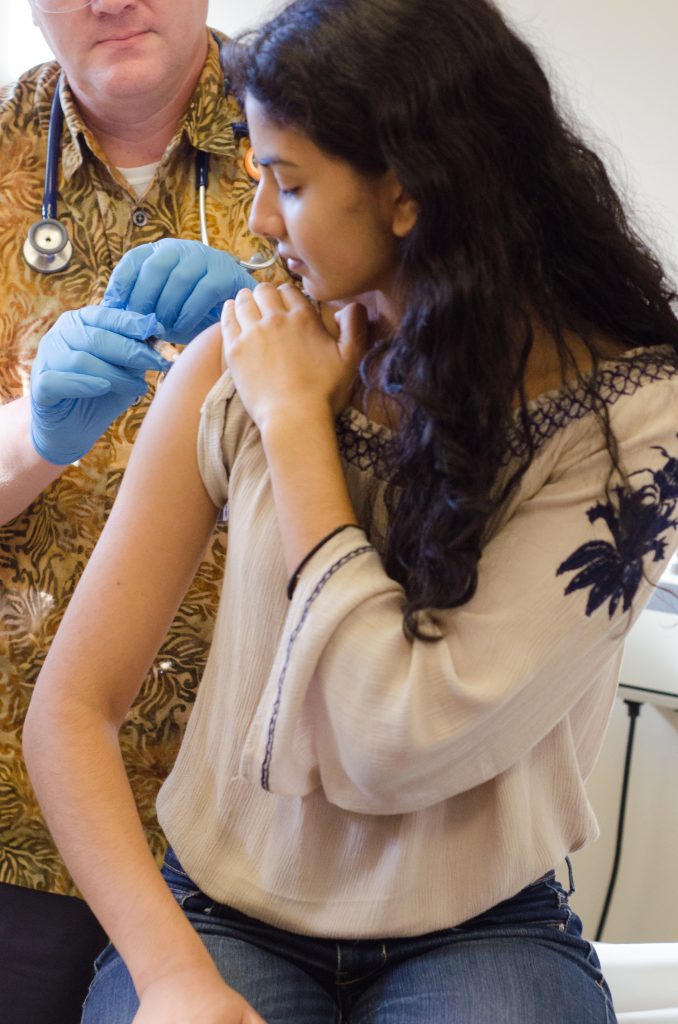
If the coughs and colds haven’t given it away, flu season is fast approaching, and Binghamton University is preparing to prevent the spread of germs.
The focus of this season’s preventative measures against sickness will center around flu clinics on campus. The clinics will offer free flu shots to students, faculty and staff every Wednesday in October at Decker Student Health Services Center. The Employee Assistance Program (EAP) will administer flu shots to faculty and staff, billing their insurance.
Richard Moose, medical director of Decker Student Health Services Center, said he encourages students and faculty to receive a flu shot.
“Getting the flu shot is the single most important thing they can do to protect themselves and others from complications of the flu,” Moose said. “Benefits include less chance of getting the flu at all, if you still get the flu after the shot, it is usually milder. [There is] decreased risk of hospitalization from the flu, decreased risk of admission to an intensive care unit from the flu and decreased risk of death from the flu.”
Decker Student Health Services Center is working to raise awareness of the flu shot program by training interns from Real Education About College Health (REACH), a peer education internship that heightens students’ awareness and understanding of health issues on influenza. The interns will be based in Decker Student Health Services Center and will have short, focused conversations with fellow students about the dangers of the flu and benefits of the flu shot.
Last year, Decker Student Health Services Center offered free flu packs that included medicine, tea, cough drops and other items for students. However, it is unclear if it will be implementing the initiative again.
Decker Student Health Services Center will be distributing free mini hand sanitizers throughout flu season. Noel Clinton Feik, director of health and counseling services, said she encourages students to be mindful of hand hygiene, which includes washing your hands carefully, using hand sanitizer and avoiding touching your eyes, nose and mouth to limit the risk of germs spreading.
Feik also said students should not go to class if they have flu symptoms, which include fever, nausea, coughing, a sore throat, a runny nose, body aches and headaches. Going to class while sick can increase the risk of spreading germs, and may mean students don’t get adequate rest to recover from their illness, which could mean it takes longer for the illness to leave their systems. Therefore, Feik said she advises students to communicate with faculty and let professors know they are sick.
“I encourage students to be in communication with faculty; and if they are having flu symptoms, they should stay in their rooms and treat symptoms and call Decker Health Services when there is a question,” Feik said. “My experience is that students are so dedicated to their academics that they put their health on the back burner.”
However, not all students are sure about receiving a flu shot. Pamela Sharlach, a sophomore majoring in business administration, said she didn’t get inoculated last year because she wasn’t sure the shot would actually work.
“I did not get a flu shot last year because I heard it was a different strand and did not think it would protect me,” Sharlach said.
Others, like Jonah Maryles, a freshman majoring in human development, said they will get a flu shot to prevent getting sick.
“I will get a flu shot this year because I know how important it is to prevent the flu,” Maryles said. “This is an easy way of trying to do that.”
Gitl-Yevgeniya Driker contributed reporting to this article.


